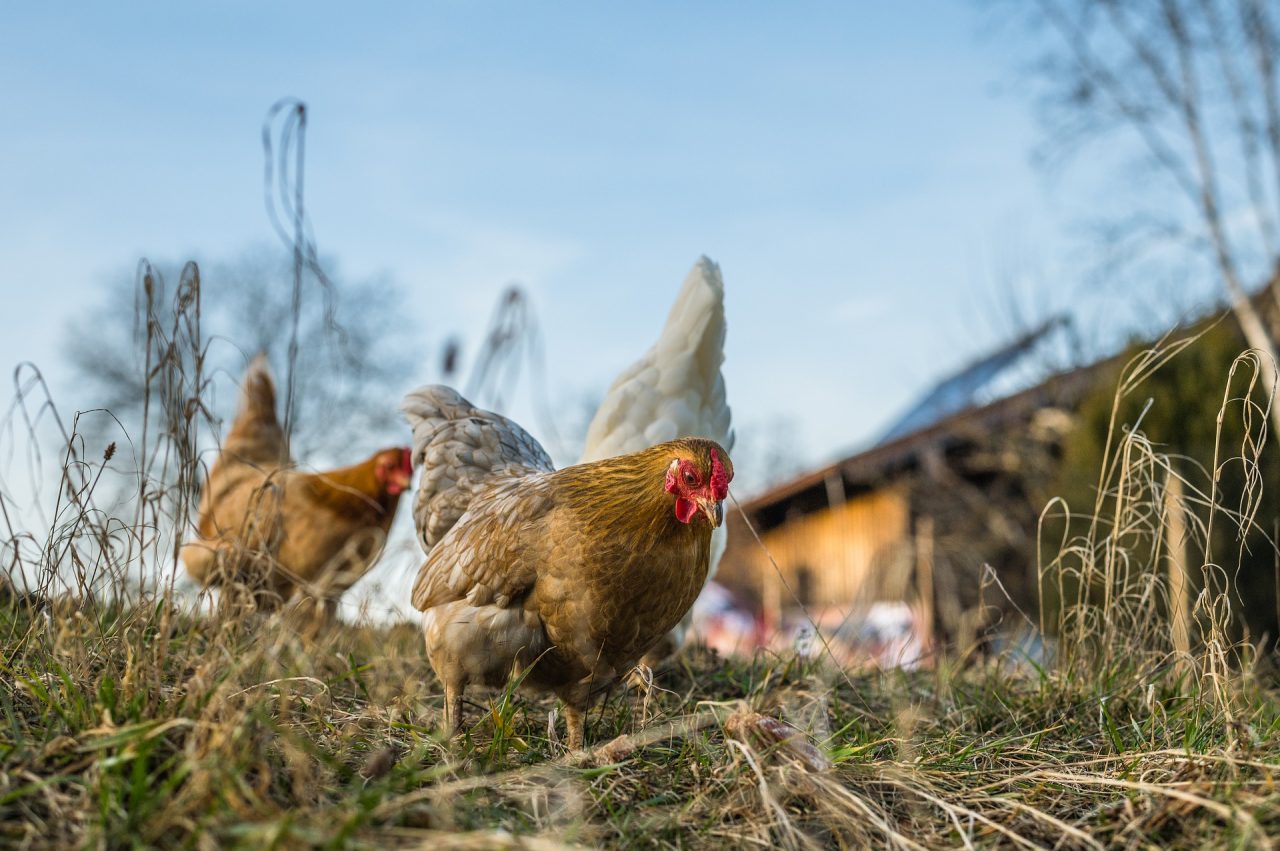Business
Council officers conduct visits in response to Avian Influenza incident

Following the identification of Highly Pathogenic Avian Influenza in poultry at a site near Milford Haven in Pembrokeshire and the declaration of an Influenza Protection Zone and wider Surveillance Zone surrounding the Infected Premises (by the Chief Veterinary Officer for Wales), on Friday 9 September, officers from Pembrokeshire County Council’s Public Protection Division have been engaged in visiting addresses within the 3 kilometre Protection Zone around the site.

Officers are identifying locations where poultry and/or other captive birds are kept and to provide information on restrictions that currently apply to help prevent the spread of disease.
The Council’s officers are working in support of veterinary colleagues from the Animal and Plant Health Agency who are managing a co-ordinated response to the incident, in collaboration with the Welsh Government, Food Standards Agency and Public Health Wales.
A map showing the extent of the zones and restrictions that apply can be seen on the Welsh Government website at https://gov.wales/declaration-avian-influenza-protection-zone-surveillance-zone-near-milford-haven-pembrokeshire, and road signs are currently being erected by the local authority to help clarify where these zones begin and end, which will remain in place until the restrictions can be lifted.
It is vital keepers of birds remain vigilant and ensure they have the very highest levels of biosecurity in place.
Responsibilities of people who keep birds:
- All keepers of kept birds should be vigilant for signs of the disease such as increased mortality, respiratory distress and drops in food or water intake, or egg production.
- Consult your veterinary surgeon in the first instance if your birds are unwell.
- If you or your vet suspect that avian influenza could be causing illness in your birds, you must, by law, report this to the Animal and Plant Health Agency Wales on 0300 303 8268. This will trigger a disease investigation by APHA vets.
- You must apply strict biosecurity measures to prevent any materials, equipment, vehicles, clothing, feed or bedding that could have been contaminated from wild birds coming onto your premises. Further guidance is available here: biosecurity and preventing disease in captive birds.
The UK health agencies advise that the risk to public health from the virus is very low and the UK food standards agencies advise that avian influenza poses a very low food safety risk for UK consumers.
Members of the public who do not keep birds can help by reporting dead wild birds. You should call the Defra helpline on 03459 33 55 77 if you find:
- One or more dead bird of prey or owl
- Three or more dead gulls or wild waterfowl (swans, geese, ducks)
- Five or more dead birds of any species
These may be collected for examination and avian influenza surveillance, depending on the species and location. It is important not to pick up or touch any sick or dead bird.
Sick or injured wild birds should not be reported to Defra. Instead contact the RSPCA (in Wales and England) on 0300 1234 999 who may be able to offer assistance.
Dead or sick birds in public places, such as beaches, can also reported by calling 01437 764551 (or out of hours 0345 601 5522) for Pembrokeshire County Council to arrange to collect safely.
Business
Legal call to stop £6m expansion of holiday park still ongoing

A LEGAL request to overturn a Pembrokeshire County Council-granted approval for a £6m expansion of a south Pembrokeshire holiday park is still ongoing despite a previous announcement it had been turned down, county planners heard.
Back in February, Pembrokeshire planners were informed a legal challenge to a November 2023-granted application for works at Heritage Park, Pleasant Valley/Stepaside had been launched.
The holiday park scheme had previously been backed twice by county planners after a ‘minded to approve’ cooling-off period was invoked as it was against repeated officer recommendations to refuse.
The controversial scheme by Heritage Leisure Development (Wales) Ltd includes the installation of 48 bases for holiday lodges, a spa facility at a former pub, holiday apartments, a café and cycle hire, equestrian stables, a manège and associated office, and associated works.
It is said the scheme, next to the historic remains of the 19th century Stepaside ironworks and colliery, will create 44 jobs.
Officer grounds for refusal, based on the Local Development Plan, included the site being outside a settlement area.
Along with 245 objections to the current scheme, Stepaside & Pleasant Valley Residents’ Group (SPVRG Ltd) – formed to object to an earlier 2019 application which was later withdrawn – also raised a 38-page objection, with a long list of concerns.
A failed legal challenge to try and overturn a council decision to approve three separate planning applications at Heritage Park was launched in 2021 by SPVRG Ltd, which failed in early 2022; the council awarded costs of £10,000 despite external legal fees paid totalled £34,000 plus VAT.
At the June meeting of Pembrokeshire County Council’s planning committee members were told the recent judicial review call by SPVRG Ltd had been refused by the high court, the grounds put forward “not considered to be reasonably arguable”.
Committee chair Cllr Simon Hancock said a council request for SPVRG Ltd to pay costs incurred by the county council in defending the claim had now been submitted.
Following that, at the July planning meeting, in his chair’s announcement, Dr Hancock gave a clarification on the position.
“I can advise that whilst the application for judicial review was refused by the High Court Judge on May 31, 2024, the appellants have challenged this decision.
“This matter is listed for a renewal hearing, and accordingly the legal challenge is still in progress; I’m hoping that’s a clarification from the announcements I made back in June.”
Responding to the clarification, Trish Cormack of SPVRG Ltd pointed out it was not “an appeal,” adding: “Firstly, we are ‘requesting the decision to be reconsidered at a hearing,’ which is a bit less dramatic than ‘challenging the decision’.
“Secondly, the claim remains open for seven days after the decision on the papers in expectance of you requesting the hearing, and the form 86B comes attached to the decision with the case number already filled in for you. This is just part of the process for a judicial review. If the Judge really thought there were no merits to the case, he was free to issue a ‘without merits refusal’.
“That would have ended the claim there and then. The only way to resurrect it would have been to take it to the appeal court. But he didn’t.
“Thirdly, the announcement makes it sound like our ‘challenge’ had happened after their previous announcement, whereas in fact we only had seven days from May 31 in which to make the request, so they knew the moment we did (June 7) because we had to simultaneously email it to the court, PCC and the developer’s agent. So, they knew full well that there would be a renewal hearing.”
Business
5 signs your car’s air conditioner needs regassing

Nothing is more frustrating than switching on your car’s air conditioning in the sweltering heat, only to be met with a blast of warm air. And with Britain likely to face more frequent and intense heatwaves due to climate change, well-functioning AC could become more a matter of health and safety than comfortable travel.
While there are several reasons why your car’s air conditioning might not perform optimally, one of the most common causes is the need for a regas. Below, we explore the key signs that indicate your car’s air conditioner may need regassing.
- Warm air blowing from the vents
If the air blowing from the AC vents is warm or not as cold as it used to be, then the system likely has low levels of refrigerant – the chemical responsible for absorbing heat and cooling the air that’s then blown into the cabin. When the levels are insufficient, the system cannot cool the air effectively, resulting in warm air being circulated.
- Inconsistent cooling
If the temperature of the air fluctuates while the AC is running, the system is likely struggling to maintain a consistent cooling performance. This inconsistency can be particularly noticeable during longer journeys, where the air may start off cool but gradually become warmer.
- Reduced efficiency
Reduced efficiency in your car’s air conditioning system can manifest in several ways. You might notice it takes longer for your vehicle to cool down, or that the system can’t maintain a cool temperature on scorching days. This reduced efficiency is often due to low refrigerant levels, which prevent the system from operating at its full potential.
- No noticeable difference
Similarly, if there’s little to no noticeable difference in air temperature when you switch the AC on and off, this strongly indicates the refrigerant levels are critically low and a regas is needed to restore the system’s functionality.
- You can’t remember the last regas
Finally, if you cannot remember the last time your car’s air conditioning system was regassed, it’s likely overdue. Most manufacturers recommend regassing every two years to ensure optimal performance. Even a well-maintained system will lose refrigerant over time, so regular top-ups are needed to keep the AC running efficiently.
When to get a regas
If you notice any of these signs, you should book an aircon regas service with a professional. They can perform a proper inspection and resupply your AC system if necessary.
Getting a regular service every two years or so will help keep your AC system working efficiently, keeping you safe and comfortable in hot weather and prolonging the life of your car’s air conditioning system.
Business
Commercial property demand falls but investment enquiries for industrial space up

OVERALL occupier demand for commercial property in Wales declines at all-sector level
Industrial space continues to outperform both retail and office sectors
Surveyors in Wales more optimistic on the 12-month outlook for capital values
Occupier demand for commercial property in Wales fell in Q2 after rising through the first quarter of the year according to the latest Royal Institution of Chartered Surveyors (RICS) Commercial Property Monitor as the industrial sector continues to outperform both office and retail.
A net balance of -17% of surveyors in Wales reported that occupier demand fell at all-sector level through the second quarter of the year. Looking at the subsectors, demand for both office and retail space was reported to have declined, with net balances of -25% and -27% respectively. Occupier demand for industrial space was noted to have fallen flat through Q2.
At all-sector level, a net balance of -19% of surveyors in Wales reported a fall in investment enquiries. Investment enquiries were up in the industrial sector, with a net balance of 6% of respondents noting an increase. A net balance of -36% of survey respondents noted a fall in demand from investors, and -27% reported a fall for office space.
Capital values are expected to fall in the short term, with a net balance of -13% anticipating a decline over the next three months at all sector level, down from 7% in Q1. Looking at the subsectors, industrial space is the only subsector in which capital values are expected to rise with a net balance of 27% anticipating an increase. A net balance of -23% of Welsh respondents expect a fall in retail space and -43% in office space.
On the 12-month horizon, surveyors in Wales appear more upbeat with a net balance of 13% of respondents anticipating a rise in capital value expectations over the next year at all-sector level. Surveyors in Wales anticipate that capital values for both office and industrial space will rise over the next year, 8% and 47% respectively whilst retail space is expected to fall (a net balance of -17%).
Chris Sutton of Sutton Consulting Ltd in Cardiff commented: “The industrial market remains strong, particularly along the M4 corridor with quoting rents of £9.00+psf on St Modwen Park, Newport for Grade A large units. On the opposite side of Newport, KLA has developed a 220,000 sq ft production / R&D facility at Imperial Park. Other bright spots are the data and energy sectors. In Cardiff, Grade A offices remain in demand as tenants readjust their occupational footprints to increased tech and new working practices.”
Haydn Thomas of Hutchings &| Thomas property consultants, in Newport added: “The South Wales commercial property market remains fairly static, with some sectors such as industrial space and roadside drive thru doing well. Lack of supply of front door owner occupier office space remains an issue especially from 3-5,000 sq ft. Demand for office space with larger floor plates remains low; Cardiff City may be bucking this trend slightly. Retails in city centres remains a problem, however, some smaller market towns seem to be doing well in terms of occupancy.”
Commenting on the UK picture, RICS Senior Economist, Tarrant Parsons, says: “Overall activity remains relatively subdued across the UK commercial property market, with conditions seen as generally flat in Q2. That said, respondents now feel the market is moving towards the early stages of an upturn following a challenging couple of years.
“The near-term path for monetary policy will be key to the outlook for CRE investment going forward, although hopes of an immediate easing in lending rates may be optimistic given still sticky services inflation (even if the headline rate has returned to target). Away from the cyclical picture, a strong structural trend that continues is the outperformance of prime office markets compared their struggling secondary counterparts. In particular, prime offices across London are seen delivering solid capital value and rental income returns over the coming twelve months.”
-

 Education5 days ago
Education5 days agoMilford Tesco worker achieves Oxford dream and lands top legal job
-

 Crime4 days ago
Crime4 days agoHaverfordwest man admits having nearly 1000 child and animal images
-

 Crime4 days ago
Crime4 days agoYouth set to appear in court over serious sexual offences
-

 Crime4 days ago
Crime4 days agoPolice investigating after man injured during altercation in cemetery
-

 Education4 days ago
Education4 days agoPupils delight in ice cream treat from Pembrokeshire’s number one van
-

 Crime4 days ago
Crime4 days agoTown centre ‘stinking of skunk’ as police strip cannabis farm
-

 Crime3 days ago
Crime3 days agoFag-butt police court summonses spark debate in Pembrokeshire
-

 News6 days ago
News6 days agoProposal to give firefighters a council tax discount to go to Cabinet




























